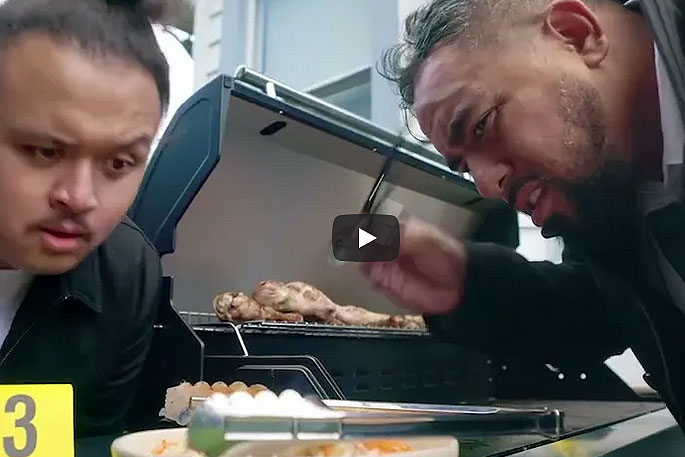It would be a crime for you whānau and friends to come down with foodborne illness this festive season – so New Zealand Food Safety and the Chicken Scene Investigators have got your back.
'Each year, over our summer, there is a rise in cases of foodborne illness and hospitalisations,” says New Zealand Food Safety (NZFS) deputy director-general Vincent Arbuckle.
'The most commonly reported illness is campylobacteriosis – caused by Campylobacter bacteria – with our youngest and oldest having the highest rates of infection.
'There were 5729 confirmed cases of campylobacteriosis in 2021, with 846 people needing hospital treatment, up from 718 in 2020. And 2022 looks set to follow a similar trajectory, with more than 5300 cases nationally so far.
'The most common source of Campylobacter from food is raw or undercooked chicken.
'So, one big thing you can do this festive season to keep your whānau and friends healthy is to make sure you handle raw chicken safely. Cook it properly and use separate utensils and chopping boards, and, as with all food, don't leave it out in the heat of the day, both before cooking and after you've finished eating.”
To help you with this, NZFS today launches a new food safety campaign. In a series of videos, our two Chicken Scene Investigators invite you to join them to spot the chicken-handling crime.
'Campylobacteriosis symptoms are nasty. They include diarrhoea, fever, headache, muscle aches, abdominal pain, and vomiting. It may also develop into more severe illness such as Guillain-Barré Syndrome, a disorder in which the body's immune system attacks its nerves, sometimes resulting in permanent paralysis.”
If you have symptoms, you can call Healthline for free anytime on 0800 611 116, or contact your doctor or practice nurse for advice.
'So, wherever you're gathering – from BBQs to work dos, beach parties to kai at the marae, Christmas lunch or potluck dinner – make sure you don't contaminate your plate this summer.”
Te Whatu Ora Medical Officer of Health Jay Harrower adds: 'Every year thousands of people are diagnosed as being infected with campylobacter, and for some it can be very serious. Across New Zealand campylobacter cases are spiking once again this summer, but there are simple steps everyone can take to reduce the risk to them and their whānau.”
Chicken Scene Investigator tips to keep your whānau and friends safe:
- Keep your raw chicken separate from ready-to-eat and fresh foods, using separate chopping boards, plates, and utensils. Alternatively, wash them properly with hot soapy water before using for other foods.
- Don't wash the chicken. Rinsing it will just spread the bacteria to other surfaces. Pat it dry with a paper towel instead, if needed.
- Wash your hands in warm soapy water after handling raw chicken.
- Make sure the chicken is fully cooked before serving – it can't be pink and the juices should run clear. Or use a meat thermometer, if you have one, to ensure the chicken is steaming hot (over 75°C) all the way through.
- Use a different plate for raw and cooked chicken.
- If in doubt, clean surfaces and utensils some more, cook your chicken some more.



0 comments
Leave a Comment
You must be logged in to make a comment.